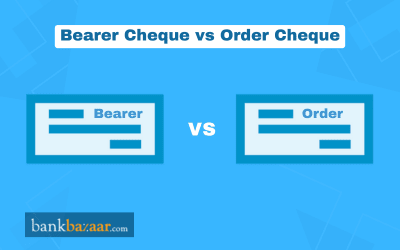Difference Between Bearer Cheque and Order Cheque
In India, a cheque is one of the most used forms of payment. It had dynamic characteristics and transformed the way money was transferred. Cheques are a responsible, safe, and convenient way to make payments. There is less chance of fraud because real money is not utilized during the process. Because of this, cheques are a safer option. Two major types of cheques are Bearer Cheque and Order Cheque.
What is a Bearer Cheque?

Instead of being paid to a specific individual or organization, a bearer cheque is payable to anyone who is in possession of it. This allows anyone holding the cheque to cash or deposit without presenting an id or by signature. Bearer cheques provide simplicity of use and speedy transactions, allowing for easy transferability and quick access to funds. However, because anyone who has a cheque can withdraw the money, those who come with risks like theft or loss.
Advantages of Bearer Cheque
Here are few advantages of Bearer Cheque which are listed below:
- Paying with a bearer cheque at the counter is quite easy
- Bearer cheques are easy to handle since the negotiation does not require approval
- It is helpful when conducting minor transactions
- Those without a bank account can quickly obtain payments from the bank through cheque without requiring certification and signature verification
- They are easily convertible into order cheques.
What is an Order Cheque?
A cheque payable to a particular individual or organization is known as an order cheque. An additional degree of security is added by requiring identification from the payee in order to cash or deposit the cheque.
Advantages of an Order Cheque
Here are few advantages of an Order Cheque which are listed below:
- Banks double-check information before completing a transaction, payments are safe
- Because of its traceability and security, it is appropriate for high-value transactions
- Without a signature it cannot be transferred, which makes it simpler to identify the parties.
Key Differences: Bearer Cheque vs Order Cheque
Here are the key differences between Bearer cheque and Order cheque as follows:
Bearer Cheque | Order Cheque |
Payable to the individual who possesses and presents the Cheque to the bank | Payable to the specific person or entity listed on the Cheque |
The holder can cash it without endorsement; it is not necessary | The cheque must be transferred to another individual |
Because the cheque can be cashed by anyone holding it, there is less security | Increased security because the payee must be identified |
Higher risk because anyone who finds it can make money from it | Reduced risk because identification is required |
It is transferable through simple delivery | With the right approval, it is transferable |
complies with fundamental legal standards | Higher security requires respect to stricter regulatory criteria |
FAQs on Difference Between Bearer Cheque and Order Cheque
- What is the validity period of a Bearer Cheque?
The Reserve Bank of India (RBI) states that a Bearer Cheque has a 3-month validity period. The cheque goes expired after that, and banks won't accept it.
- Is it possible to cash an Order Cheque?
Only the party or individual in whose name the order cheque was drawn may cash it. The person picking up the cheque needs to show their identification in order to cash it.
- What is a Bearer cheque's limit?
A Bearer Cheque has no withdrawal restrictions. Before processing any transactions of funds above Rs.50,000, the bank will verify the identity of the customer.
- Which Cheque is more secure?
An Order Cheque is more secure because only the intended payee can exchange it, whereas a Bearer Cheque can be used by anyone in possession of it.
- Can the Order Cheque be transferred to someone else?
Yes, but only through endorsement Order Cheque can be transferred.

Disclaimer
Credit Card:
Credit Score:
Personal Loan:
Home Loan:
Fixed Deposit:
Copyright © 2026 BankBazaar.com.